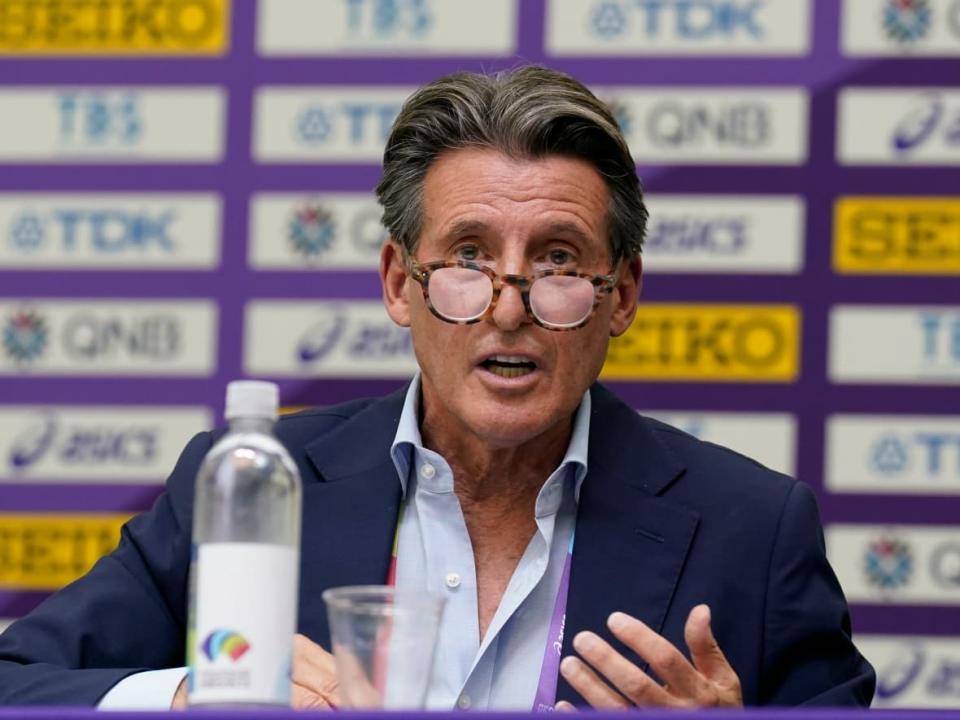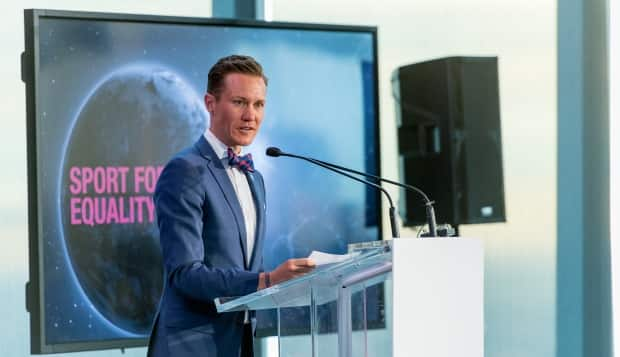Debate rages following World Athletics’ ban on trans athletes in elite female sport

World Athletics says its decision this week to ban transgender women from participating in elite female sports was based on an “overriding need to protect the female category.”
But the organization’s president, Sebastian Coe, says there is more to the move to exclude trans athletes who have gone through male puberty. Coe says the move is about fairness to inclusion and comes after months of being “swamped” by advocacy groups that no other alternative would be acceptable.
“We entered a consultation a few months ago because we wanted to provoke a debate,” Coe told a global audience. “It was really important that we heard from all our stakeholders, including the athletes, the coaches and the member federations.
“Female athletes, coaches, our member federations; they were absolutely clear that there was absolutely no way at that point to include transgender athletes in elite competition in the female category,” said Coe.
Few athletes were willing to speak out publicly on the issue, but some did on social media.
“A big step for fairness and protection of the female category. Hopefully this will now be the norm at all levels, not just elite ranked events,” tweeted British runner and Olympian Emily Diamond, who won bronze in the 400m relay at the Rio 2016 Olympics.
Olympian and marathon runner Mara Yamauchi tweeted, “Good news! Strange to celebrate something that is common sense.”
Under the previous rules, transgender women could compete in the female category as long as their testosterone levels were below five nanomoles per liter for a period of one year.
Critics and new research suggest that male puberty triggers skeletal and cardiovascular benefits beyond testosterone levels that cannot be mitigated or reversed by testosterone suppression.
“Athletes with male biology who move into the female category run the risk of damaging the integrity of that category and the integrity of competitions,” Coe said.
CLOCK | Weightlifter Laurel Hubbard becomes the first trans athlete to compete in the Olympics:
World Athletics is the second major sport to move away from the testosterone model. Swimming’s world governing body, World Aquatics, voted last June to ban transgender women from elite competition if they had experienced any part of male puberty.
World Rugby has also implemented a similar policy.
Those who have long been pushing for a ban say World Athletics’ decision will have far-reaching implications for the entire sporting world.
“[World Athletics is] one of the best sports organizations in the world,” said Linda Blade, President of the Board of Athletics Alberta. “It’s considered the core sport of the Olympics, so it has a lot of influence.
“There are so many sports governing bodies around the world that look to World Athletics to determine fair guidelines for eligibility. Not only do you have the policies, you also have how to enforce them.”
“Inclusion and fairness don’t always go together”
Athletics Canada CEO Mathieu Gentès told CBC that World Athletics has not consulted the organization on the issue, adding that this week’s decision was “much stricter” than expected.
According to Gentès, Athletics Canada’s current inclusion policy encourages grassroots participation at the local level in any category that participants choose to identify with without restrictions. But when it comes to World Athletics sanctioned events, they must follow the new rules.
“Inclusion and fairness don’t always align 100 percent, depending on what level of sport you’re looking at,” Gentès told CBC. “We think it’s important that people feel welcome in the sport and have a place to participate, but at the same time we think it’s important that the integrity of the women’s competitive categories is maintained as well.”
CLOCK | FINA votes to limit the participation of transgender people in elite women’s competitions:
Chris Mosier is the founder of transathlete.com, an educational resource on trans inclusion. He was also the first openly transgender man to ever compete against other men in an Olympic trial. He says the “incredibly disappointing” decision throws out the core principles of inclusion, fairness and non-discrimination.
Mosier says the directive will have a profound impact far from Olympic competitions in crowded stadiums. He says when powerful bodies like World Athletics make decisions, there’s an unseen trickle-down effect.
“Given all the messages young transgender people are hearing about whether or not they belong and whether or not they are okay with being themselves and whether they deserve the same opportunities as their peers to play the sports they do loving and being accepted, it’s really disturbing,” Mosier told CBC.
“Not only the few top athletes will be negatively affected here, it’s the young kids who can no longer imagine having a sporting career or pursuing their passions.”

Additionally, Mosier says the ban addresses an issue that barely exists at the sport’s elite level. No transgender athletes currently compete in elite international competitions.
“They chose to exclude a group of people who anticipate a problem rather than react to a real problem in sport. Transgender women are underrepresented at all levels of the game. They even acknowledge that there aren’t enough athletes to research on.” Mosier told CBC.
“By banning the athletes who would need them for the research, they essentially eliminated the opportunity for transgender athletes to participate. We see an organization enacting a policy that disproportionately impacts a very small group of people.”
But Athletics Alberta’s Linda Blade says it’s not that simple.
“It’s a problem even if a person doesn’t get an Olympic gold medal or a person gets a different result in their race because of a clear breach of ethics.
“It’s like saying only one or two people dope. That’s not how the sport works. Either we have an admission limit or we don’t.”
CLOCK | Cyclist Veronica Ivy talks about misunderstandings about trans athletes:
This debate is far from over. World Athletics will establish a working group that will continue to address the issue of transgender inclusion over the next 12 months.
“We’re not saying no forever,” Coe said.
Athletes around the world will be watching intently.
“In terms of the research and studies that’s been going on, they’ve been adjusting it over the last couple of years and the line keeps moving,” says Gentès.
“They keep saying it’s based on science and new research, and I expect maybe in 12 months that’s going to change.”